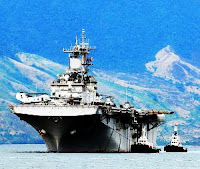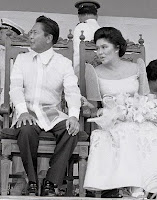Kicking the US out of our shores - a 20-year lesson for Filipinos
 The United States is reportedly taking steps to help beef up the Philippines' "maritime capacity". Southeast Asia is of strategic importance to the United States and the Philippines is the weakest link of the zone. Its long coastline and dense jungle of islands coupled with a flaccid armed forces make the Philippines a blight in a vital junction of shipping lanes -- a potential haven for pirates, transshipment point for arms and illegal drugs, and base for international terrorism.
The United States is reportedly taking steps to help beef up the Philippines' "maritime capacity". Southeast Asia is of strategic importance to the United States and the Philippines is the weakest link of the zone. Its long coastline and dense jungle of islands coupled with a flaccid armed forces make the Philippines a blight in a vital junction of shipping lanes -- a potential haven for pirates, transshipment point for arms and illegal drugs, and base for international terrorism.The pledge came from US Assistant Secretary of State for East Asian and Pacific Affairs Kurt Campbell on the first day of an inaugural security dialogue between the two allies.
"One of the subjects for discussions tomorrow will be the bilateral steps that (we) can take to increase the Philippines' maritime capacity," Campbell said.
This would enhance the Philippine navy's capacity to police its waters, he told a joint news conference.
"We think this is a critical component of our partnership. Much of this work is already underway and we seek to intensify it in the months and years ahead," he said without giving details.
Recall that in 1992, Filipinos pompously closed doors on any hope of extending America's further use of the Philippines as a base for its key military assets in the Pacific. Removal of US bases in the Philippines was a flagship "promise" of Cory Aquino in her successful campaign and "revolution" that saw her ascent to the Philippine Presidency in 1986; a promise which she broke in 1991 when she started a campaign to have the lease agreement between the US and the Philippines extended.
Unfortunately, a bar against further American military presence in the Philippines was by then enshrined in Cory Aquino's ironic 1987 Constitution. Furthermore, Filipinos' renowned perverse sense of "nationalism" won over the Philippine Senate whose members at the time voted 12 to 11 to reject any further evaluation of the possibility of extending American military presence in the country over a significant period. This is a testament to the destructive power of popularity-fueled political momentum that steamrollers over sober and detached critical thinking that is securely tethered to what is real.
Some estimates put the economic contribution of the US presence in the Philippines at $1 billion annually -- encompassing local employment of Filipinos, contracts with Filipino businesses, economic aid, and other indirect economic benefits that trickled into the rest of the country.
More importantly, American bases in the Philippines gave Filipinos a profile in global politics that we could never have built nor will most likely ever build on our own flaccid merits. As I wrote in my piece "American influence gives Pinoys a place in global geopolitics":
America’s influence fills a vacuum that exists in the intellectual landscape of Philippine society much the same way as another legacy of American presence — the jeepney — fills a void in our country’s mass transport capability.
We as a people lack a cohesive agenda and vision that is bigger than the petty politics that frames our politicians’ posturings. Here then is what is real: Whether we like it or not, American influence gives us a place (pathetic as it may be) in global geopolitics. It is a choice between that and the laughable small-mindedness of Pinoy thinking that will determine and govern that place.
And even more realistically;
If America withdraws its influence on Philippine internal affairs, some other global power will simply step in to fill the void.
A testament to this is the sorry record of attempts of Filipinos to build upon the infrastructural wonders left behind by the Americans at its biggest facilities in Subic Bay in Zambales and Clark in Pampanga. Indeed, as I wrote in yet another piece "We can still be friends"...
there is no shortage of reminders on the extent by which our faculties for exercising a bit of imagination remain utterly stunted. This trait of ours in conjunction with, our renowned heritage of smallness, our focus on the droll, trivial, and irrelevant, and our insularity, i.e., ...[...] narrowly restricted in outlook or scope; being provincial, being narrow in scope, or considering only small sections of an issue; narrow-minded
... go a long loooooong way in explaining why we are so utterly inept at sustainably turning resources served up to us on a silver platter into reliable streams of recurring income. Consider that the latter phrase describes the cornerstone concept of the definition of the business enterprise.
In our pathetic 100% reliance on all things foreign and 0.0000001% reliance on inherent capability (because there is none); the lack of that substance that would have routinely cushioned a crash in any number of these periodic financial collapses, simply means that our implosion as a society and as an economy sees no bottom (specially when seen in the context of the embarassing 2.3% p.a. clip at which we multiply).
Thanks to the 12 bozos who voted against US military bases in the Philippines in 1991 -- Senate President Jovito Salonga, Sens. Wigberto Tanada, Teofisto Guingona, Rene Saguisag, Victor Ziga, Sotero Laurel, Ernesto Maceda, Agapito Aquino, Juan Ponce Enrile, Joseph Estrada, Orlando Mercado, and Aquilino Pimentel -- Filipinos have, right in their faces today, a sad lesson twenty years in the making in what it is like to languish outside the American sphere of what is globally relevant.
Filipinos cannot do it alone. We have proven it time and again. This is evident in how we now pathetically scrounge around for (1) foreign capital (to the point of looking seriously into throwing our doors fully open to it) and (2) political favour with America, China, and/or whatever global power will rescue us from our pathetic insignificance in the global scheme of things.




The kicker of all this is that these "playgrounds of the rich" mentioned in the article you link there are where our "industries" - oligarchy-controlled as they are - happen to be the most 'competitive.' Things like point-of-sale retail and leisure. Possibly even tourism.
ReplyDeleteFrom that I'm not quite sure that opening up the country as it is - from changing government systems to economic liberalization - will make any industries apart from the aforementioned ones any more competitive than they currently are (which isn't saying much.)
See, I've also suspected that there are plenty of politicians hungry for opening up to free trade, only they tow the protectionist lines for public image because bribes for election season come first.
And with most of the so-called capital concentrated amongst those few, politically and economically, it seems that no amount of foreign investment to aid our SMEs will help them keep up.
SM is one of the top employers in the land. Yet for all of those tens of thousands of sales personnel, we don't see a proportionate number going into the retail or trading business. It's either they learned nothing while employed in SM or they learned something but simply fail to apply it towards an entrepreneurial venture.
ReplyDeleteIndeed an scathing article. Pilipinas miss the boat again for the fifth time. The boom taking place in China should have been Philippines and that failure caused Filipinas a piece of the American pie that China now enjoys. The 12 apostles then is the harbinger of plague and disciples of MLQ without a doubt; my suspicion has always been the money to their pocket under the guise of lease. They played the bluff and the bluff was called and that's what Pinas have now. Pinas has a new generation on the mold of MLQ and the tirade "It's America's Fault" is still en vogue. The gall of Santiago and Escodero "ukay-ukay" resonates not of usefulness of the materiel but newness not thinking those same Helos are still in use allover US; and how "Imeldefic" of her -to coin Pilipino's favorite pharase- in demanding what she wants. Did anybody ask them what did they give to PAF? I bet they could not even give the PAF a kite to fly. Pilipinas can not even maintain the infrastracture left by the US that is now falling apart let alone say, give them possession of F18 whose maintenance, just one, is in the millions of dollars; then there is the question of "Trust." America failed too in mentoring Philippines even when it poured in massive tax payer resources for decades in the hope of making the Philippines having a vibrant economy; concluding that the interest of the Pilipinos is the interest of US not the other way around in contra to popular belief expounded by politicos whose true agendas is for themselves not the Pilipinos. The problem with Pilipinos is they never ask their leaders what they will give to their people in leiu of America? Still, you have Americans whose value of honor is sacred among them. Their history is full of names and places of no more value to Pilipinos. The places like Bataan, Coregidor, Leyte Gulf, Philippine Sea; these are the names of "United States Naval Ships" that is how attached the Americans to the Philippines. Then there is "Joe" not one but many, who brims with a smile upon learning of a port visit in Manila. On his thoughts a part of his heritage; it is home away from home. Damit it Joe! You never give up.
ReplyDelete